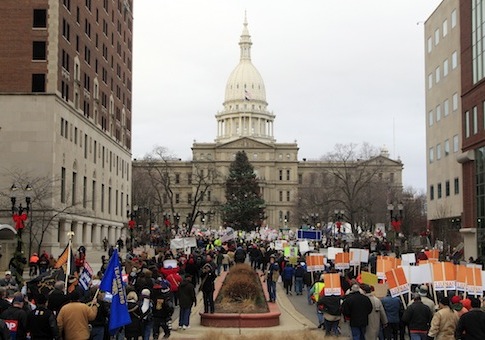Supporters of Michigan's right-to-work measure, which has been in effect for one week, are busy preparing to defend the law from powerful labor unions.
Scott Hagerstrom, state director of Americans for Prosperity-Michigan, said the group is engaged in "hand-to-hand combat for the hearts and minds of voters" to preserve the law.
"Too many people think that right-to-work is permanent and that we should be doing a victory lap," he said. "This is by no means guaranteed; the fight’s just begun."
Hagerstrom faces an uphill battle to preserve the law, which went into effect on March 28, thanks to a public campaign from the state’s union to overturn the law as well as a number of lawsuits.
Michigan Republicans successfully safeguarded the law from tactics that unions used to fight back against labor reforms in other states. They designed the legislation as an appropriations bill in order to avoid a referendum, a tactic unions used to repeal labor reforms in Ohio. They also reformed the state’s recall system to prevent the type of drawn-out political battle that Republican Gov. Scott Walker encountered in Wisconsin.
However, unions in Michigan are changing their tactics to contest the law. Opponents have hinted at repealing the law through a ballot initiative during the 2014 election.
The prospect of a ballot initiative worries Vinnie Vernuccio, director of labor policy at the Mackinac Center, more than the numerous lawsuits that unions have filed to block the law. Right-to-work has survived similar legal challenges in other states but has never faced the onslaught unions are preparing for the campaign.
"The lawsuits will fall by the wayside … but the unions are employing kitchen sink strategy, throwing everything at the law to kill it," he said.
Even if the initiative fails, liberals have the opportunity in 2014 to vote out Republican Gov. Rick Snyder and GOP majorities in the state legislature. There will be an open U.S. Senate seat as well.
All of those races could drive turnout in a way that is advantageous to unions in the dark blue state, according to Hagerstrom.
"They’re capable of spending $50 to $100 million on that election and they have nothing to lose," Hagerstrom said. "We’re starting to educate voters on worker freedom to ensure that we don’t go back to the way things were."
AFP commenced a statewide campaign to boost the law’s popularity among voters before the law went into effect. AFP has recruited union members who support the law to talk to voters about "worker freedom" at town hall meetings AFP held across the state.
"We’re trying to show them that right-to-work will not make the sky fall down like the unions have been saying," Hagerstrom said. "It is fundamentally about giving workers freedom, the freedom to not have to join a union to keep a job."
Right-to-work’s passage in Michigan shocked political observers across the country when it was signed in December. Michigan has one of the nation’s largest union memberships and is the birthplace of the powerful United Auto Workers union.
The bill inspired lawmakers in other states, including Pennsylvania, Missouri, and New Hampshire, to propose right-to-work legislation, though none has passed. Hagerstrom says right-to-work has a domino effect, but it would be premature to pursue the legislation when the law is still threatened by a ballot initiative.
"Politicians may want right-to-work in their states, but they also want to keep their jobs," he said. "Leaders in every state in the country have their eyes on Michigan. They know that if we can defend it here, we can defend it anywhere."
Hagerstrom’s lieutenant in the fight, deputy state director Annie Patnaude, said Michigan’s status as the birthplace of unionism makes it all the more important to setting the national tone for union culture.
"The unions are under the belief that we’re stuck in 1937," she said. "We invented the adversarial paradigm of labor relations; we now have the opportunity to reinvent it."
Hagerstrom does not mince words about the stakes in the campaign.
"We could look back 10, 20 years from now and say that December 11, 2012, [the day the law passed] was more important than Barack Obama’s election," he said. "It means nothing if we can’t hold it, but it could mean a right-to-work nation in every state except California and New York if we can."
